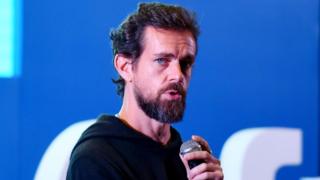Twitter boss donates $3m to basic universal income project

Image copyright
Getty Images
Jack Dorsey says the idea is “one tool” to address inequality of income, race and gender
Twitter chief executive Jack Dorsey has become the first investor in a radical plan to give people a basic income, regardless of job status.
He has donated $3m (£2.4m) to the scheme, which is being piloted by the mayors of 16 US cities.
He said it was “one tool to close the wealth and income gap”.
The idea of governments paying a basic income to citizens has gained momentum in response to the threat to jobs from artificial intelligence.
The premise of universal basic income (UBI) is that every individual in a country will receive a cash payment at regular intervals, without any requirement to work or qualify for it. The payment would be given to every citizen, regardless of wealth or employment status.
The US scheme, dubbed Mayors for a Guaranteed Income, is a version of this which would offer a recurring payment, but only to “some” residents.
On its website, it is not made explicit who will receive payments but it talks of the need to address poverty, particularly in the light of the coronavirus pandemic.
“Covid-19 has only further exposed the economic fragility of most American households and has disproportionately impacted black and brown people,” it says.
“Mayors will come together in this network to advocate for a guaranteed income – direct, reccuring cash payments – that lifts all of our communities, building a resilient, just America.”
There are no firm proposals for how money would be allocated, or for how long the scheme would last.
Mr Dorsey tweeted: “This is one tool to close the wealth and income gap, level systemic race and gender inequalities and create economic security for families”.
The project was founded by Stockton mayor Michael Tubbs, who wants it to become a national programme that will extend beyond the current pandemic.
He has previously said that raising taxes of individuals such as Mr Dorsey could be one way to fund it.
The 29-year-old is attempting to reinvent the Californian city he grew up in and has been experimenting with the idea of a universal income since 2018, paying $500 a month to 125 residents.
Joblessness threat
Image copyright
Getty Images
Robots could take many jobs currently done by humans, creating a global income shortage
Talk of a universal basic income has been around for decades but has become closely associated with the idea of artificial intelligence – the argument being that as robots take over more jobs in society, humans will need a guaranteed annual income supplied by government.
But Martin Luther King also suggested the idea in his 1967 book Where Do We Go From Here?
AI expert Calum Chace said that a universal basic income could be some way off.
“It is seen by many as a solution to the threat of joblessness as machines automate more and more of our jobs in the coming years and decades,” he said. “Unfortunately, it is wholly unaffordable if it offers anything more than abject poverty.
“But if, say, [in] a generation from now machines do take most of our jobs, we should all be able to live the lives of leisure that economists like Maynard Keynes promised long ago – if, that is, we can achieve the economy of abundance, where the cost of a very good standard of living falls close to zero.
“The idea of fully automated luxury capitalism is the next big thing, once people understand the limitations of UBI.”
